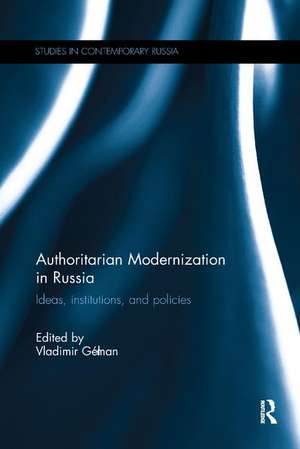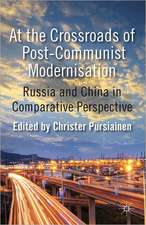Authoritarian Modernization in Russia: Ideas, Institutions, and Policies: Studies in Contemporary Russia
Editat de Vladimir Gel'manen Limba Engleză Paperback – 14 aug 2018
| Toate formatele și edițiile | Preț | Express |
|---|---|---|
| Paperback (1) | 416.22 lei 6-8 săpt. | |
| Taylor & Francis – 14 aug 2018 | 416.22 lei 6-8 săpt. | |
| Hardback (1) | 1054.71 lei 6-8 săpt. | |
| Taylor & Francis – 23 aug 2016 | 1054.71 lei 6-8 săpt. |
Din seria Studies in Contemporary Russia
-
 Preț: 311.91 lei
Preț: 311.91 lei -
 Preț: 326.49 lei
Preț: 326.49 lei -
 Preț: 311.18 lei
Preț: 311.18 lei -
 Preț: 384.09 lei
Preț: 384.09 lei -
 Preț: 384.48 lei
Preț: 384.48 lei -
 Preț: 385.25 lei
Preț: 385.25 lei -
 Preț: 383.50 lei
Preț: 383.50 lei -
 Preț: 365.87 lei
Preț: 365.87 lei -
 Preț: 385.62 lei
Preț: 385.62 lei - 17%
 Preț: 259.31 lei
Preț: 259.31 lei - 16%
 Preț: 260.93 lei
Preț: 260.93 lei -
 Preț: 394.19 lei
Preț: 394.19 lei -
 Preț: 382.75 lei
Preț: 382.75 lei -
 Preț: 389.66 lei
Preț: 389.66 lei -
 Preț: 389.66 lei
Preț: 389.66 lei - 9%
 Preț: 934.94 lei
Preț: 934.94 lei -
 Preț: 311.18 lei
Preț: 311.18 lei - 18%
 Preț: 1055.06 lei
Preț: 1055.06 lei
Preț: 416.22 lei
Nou
Puncte Express: 624
Preț estimativ în valută:
79.64€ • 83.36$ • 66.29£
79.64€ • 83.36$ • 66.29£
Carte tipărită la comandă
Livrare economică 31 martie-14 aprilie
Preluare comenzi: 021 569.72.76
Specificații
ISBN-13: 9781138361232
ISBN-10: 1138361232
Pagini: 226
Ilustrații: 24
Dimensiuni: 156 x 234 x 12 mm
Greutate: 0.45 kg
Ediția:1
Editura: Taylor & Francis
Colecția Routledge
Seria Studies in Contemporary Russia
Locul publicării:Oxford, United Kingdom
ISBN-10: 1138361232
Pagini: 226
Ilustrații: 24
Dimensiuni: 156 x 234 x 12 mm
Greutate: 0.45 kg
Ediția:1
Editura: Taylor & Francis
Colecția Routledge
Seria Studies in Contemporary Russia
Locul publicării:Oxford, United Kingdom
Cuprins
1. Introduction: Why Not Authoritarian Modernization in Russia? 2. Fathers versus Sons: Generation Changes and the Ideational Agenda of Reforms in Late Twentieth-Century Russia 3. The Dilemma of Perception on Russian Strong State and Demand for Modernization 4. Framing Modernization in Russian Newspapers: Words, Not Deeds 5. Authoritarianism and Institutional Decay in Russia: Disruption of Property Rights and the Rule of Law 6. Russian People’s Front and Hybrid Governance Dilemma 7. Social Network Sites and Political Governance in Russia 8. Russia’s Post-Neoliberal Development Strategy and High-Technology Considerations 9. How does the Government Implement Unpopular Reforms? Evidence from Education Policy in Russia 10. Choosing between Bureaucracy and the Reformers: The Russian Pension Reform of 2001 as a Compromise Squared 11. Labour Reform in Putin's Russia: Could Modernization Be Democratic?
Notă biografică
Vladimir Gel'man is a Professor at the Department of Political Science and Sociology, European University at St.Petersburg, and Finland Distinguished Professor at the Aleksanteri Institute, University of Helsinki. He is an author and editor of more than twenty books in Russian and in English, including The Politics of Sub-National Authoritarianism in Russia (Ashgate, 2010), ). He was also a visiting professor at the University of Texas at Austin, the Central European University, Budapest, and the New Economic School, Moscow, and published numerous book chapters and journal articles in Europe-Asia Studies, Post-Soviet Affairs, International Political Science Review, Democratization and others.
Recenzii
While many authoritarian governments attempt ambitious economic modernization projects, fewer – indeed, far fewer that we realize – actually succeed. This timely book deftly explores the fate of the authoritarian modernization project in Russia, from its promising historical roots through its post-Soviet failures. It stands out for its comprehensive examination of efforts to modernize Russia in realms as diverse as education, high technology, labor, and pension policies. While leaving a glimmer of hope for future progress, the authors convincingly demonstrate that significant structural, political, and institutional barriers stand in the way of Russia’s authoritarian modernization project. An important book on a crucial topic for Russia and the international community, Authoritarian Modernization in Russia deserves to be read widely by policy makers and scholars around the world." - Juliet Johnson, Professor of Political Science, McGill University, and author of Priests of Prosperity: How Central Bankers Transformed the Postcommunist World (Cornell 2016).Authoritarian Modernization in Russia is a stimulating analysis of post-Soviet economic, political and policy-making dynamics. An excellent team of Finnish and Russian scholars highlights trajectories of top-down reforms that prioritize economic advancements over political liberties. The book offers a thorough examination of challenges and constraints that affected the project of authoritarian modernization in Russia and adds sophistication to the debates on how Russia really works and whether it can modernize.
Alena Ledeneva, Professor of Politics and Society, School of Slavonic and East European Studies, University College, London
Alena Ledeneva, Professor of Politics and Society, School of Slavonic and East European Studies, University College, London
Descriere
Post-Communist Russia is an instance of the phenomenon of authoritarian modernization project, which is perceived as a set of policies intended to achieve a high level of economic development, while political freedoms remain beyond the current modernization agenda or are postponed to a distant future. This volume encourages further discussions about the logic and mechanisms of the authoritarian modernization project in post-Communist Russia and its effects on Russia’s politics, economy, and society.













